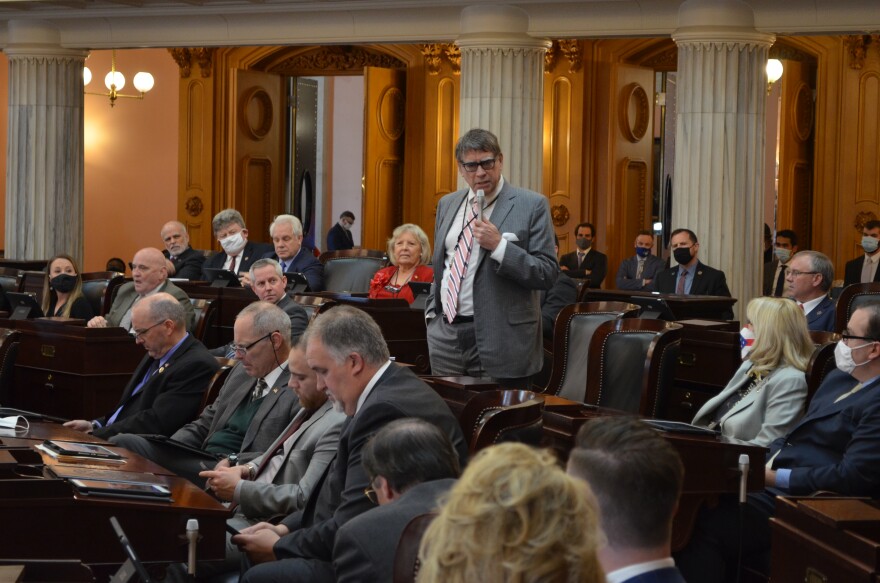The Ohio House and Ohio Senate have voted to override Gov. Mike DeWine's (R-Ohio) veto of Senate Bill 22. The move can enact a law that weakens the authority of a governor's orders and emergencies.
Throughout the past year, Republican leadership in the House and Senate have clashed with DeWine over the health orders he's issued in response to the COVID-19 pandemic.
That clash culminated in the form of the legislature overriding DeWine's veto.
The bill limits a state of emergency to 90 days, gives lawmakers authority to terminate a state of emergency after 30 days, and allows them to terminate orders coming out of that emergency, all through a resolution.
For example, health orders issued under the current state of emergency include last year's Stay-At-Home order and the current mask mandate.
Sen. Rob McColley (R-Napoleon) says this change brings more accountability and allows legislators to represent their constituents in the order-making process. He also disagrees with DeWine's claim that the bill is unconstitutional.
"There are over a dozen other examples of the legislature being able to override an action of the executive branch via concurrent resolution already in the revised code, unchallenged, sometimes for four decades," says McColley.
Sen. Nickie Antonio (D-Lakewood) opposed the override vote. She says SB22 creates roadblocks that can slow down the response time during a pandemic, saying the governor needs the authority to issue emergencies and health orders to quickly respond to a dilemma.
"In an emergency, when there's a crisis. We are a deliberative branch of government. We are coequal. But sometimes, and you all got to be with me on this, our deliberation takes a while," says Antonio.
The Senate approved the override by a vote of 23-10 and the House approved the override with a vote of 62-35. The breakdown was mostly along party lines, with only three Republicans voting with Democrats against the override.
On the floor, House Minority Leader Emilia Sykes (D-Akron) says when it comes to creating health orders to protect the public, the process is better left to health experts and not the Ohio legislature.
"You all are great at a lot of things, you are brilliant orators, lawyers, business owners, farmers, and more, but you are not good at public health. And I dare any of you to debate me on that because you can't. And I can tell, as you're smirking at me with you not wearing a mask. You are not good at public health. This is not your lane. You need to get out of it," Sykes says.
But House Speaker Bob Cupp (R-Lima) says Ohio is joining 26 other states that have a process like this to check the governor's orders.
"Ohio is way behind in that because we have a very old statute and the pandemic sort of brought that to light. And so we are just adjusting and modernizing our statute. It is not a personal thing between the legislature and the governor, no matter what the Democrats might say," says Cupp.
This is the first time the Ohio legislature has voted to override a governor's veto in more than two years. In December 2018, the House and Senate approved an override of then-Gov. John Kasich's veto of HB228. That was a bill that shifted the burden of proof in self-defense cases from the defense to the prosecution.
Last year, Gov. DeWine vetoed three bills outright, including legislation similar to SB22. However, the legislature did not hold a vote to override any of those vetoes.
Senate President Matt Huffman (R-Lima) was asked why lawmakers created this process instead of passing bills to rescind a governor's orders.
"The General Assembly needs to be able to act without the governor vetoing that bill and having to come back and of course overriding the veto and going through some of the apparent unpleasantness that we've had over the last couple of months," Huffman says.
The Legislative Service Commission, a nonpartisan entity that researches and drafts bills for lawmakers, said in its analysis that there are constitutional questions about rescinding a governor’s order by concurrent resolution, and the bill could violates separation of powers if it is attempting to give the General Assembly a legislative veto authority.
"Governor DeWine, through his letter Monday and his veto message yesterday, made his serious concerns regarding Senate Bill 22 known to the members of the General Assembly and to the public," said Dan Tierney, DeWine's spokesperson, in a written statement. "In addition, those who provide healthcare and public health services across Ohio, as well as colleges, local officials, and community organizations, also expressed their deep concerns about Senate Bill 22. Governor DeWine remains focused every single day on doing all he can to ensure every Ohioan who wants a COVID vaccine can get one in the coming weeks, which is truly what will help Ohio put this pandemic behind us."
The bill does not go into effect for another 90 days. DeWine has said the legislation could likely be challenged in court.





